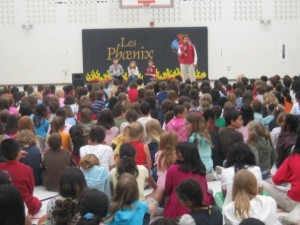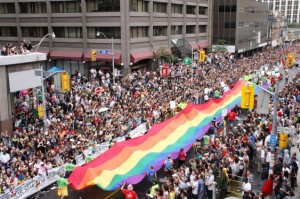When asked if I wanted to be on the Canadian Olympic Committee’s float at the Toronto Pride Parade, I found myself, not for the first time, questioning what it really means to be a role model.
 The first time I found myself considering if I was a role model I was 24 years old, a World and Olympic Champion, and talking about believing in yourself and being brave enough to chase your dreams. Just back from the 1992 Barcelona Olympics, I was talking to a group of grade 9 and 10 students about the ups and downs that preceded winning my 2 new shiny gold medals. Amid all the typical/easy questions like, “Are they made of real gold?”, “Where do you keep your medals?” or “How old were you when you started rowing?”…came a zinger. A student stood up, looked at me quite earnestly and asked, “Do you see yourself as a role model?”
The first time I found myself considering if I was a role model I was 24 years old, a World and Olympic Champion, and talking about believing in yourself and being brave enough to chase your dreams. Just back from the 1992 Barcelona Olympics, I was talking to a group of grade 9 and 10 students about the ups and downs that preceded winning my 2 new shiny gold medals. Amid all the typical/easy questions like, “Are they made of real gold?”, “Where do you keep your medals?” or “How old were you when you started rowing?”…came a zinger. A student stood up, looked at me quite earnestly and asked, “Do you see yourself as a role model?”
I wanted to laugh – me? (Ha!) Sure I had won a race or two but a role model? I was just a rower; and when not rowing I thought of myself as really ‘normal’ and often lazy. I knew all of my flaws; I knew how much better I thought I could be – a better rower, a better friend, a better person. My inner-voice answered ‘no way’ to the role model question. But before I answered aloud I thought it through. What is a role model? Who were mine?
To me, role models demonstrate behaviours that we hope that we will demonstrate in the same, often challenging, situations. I couldn’t think of one person that was my all-encompassing role model – but I could think of many people and the different things that they had accomplished or said that I thought were pretty cool.
I’ve seen acts of focus, strength, kindness, bravery, generosity, humour, intelligence and thoughtfulness that have inspired me. I have tremendous admiration for those who have built and demonstrate strong, loving and lasting relationships. I want and hope for all of that. I watch people who demonstrate these traits and, when possible, I try to emulate them.
When the young girl asked if I thought that I was a role model, it was probably because she saw some bits of me- what I had done or how I had done it – as things that she wanted and hoped for herself.
The best answer I could give was that I never thought of myself as a role model but I could see how I had become one. I told her that– regardless of what my first, lazy inner-voice suggests that I do, it is important for me to act as promptly as I can; to be honest and genuine equally in public forums and in private ones; and to ‘step up’ during challenging times as much as easy times. The question— and the answer that I came to, made me realize that whether I had chosen it or not – I was a role model and I was being watched.
When the Canadian Olympic Committee told me that for the first time, they were going to put a float into the June 30th 2013 Toronto Pride Parade my ‘lazy’ self wondered, “Do I have to go in this?” It’s not just for gay athletes; allies are welcome too….but I am gay – this float is about me, and people like me. I found myself once again questioning what it means to be a role model.
After twenty years of being watched as an athlete, mentor, speaker, author, partner… Do I still see the same things as important? My inner voice still wonders how or why I should be considered a role model. I’m still just me, I still know all my flaws. But I still hope to be genuine and honest and I try hard to do the right thing, even when my lazy inner-self wants to take the easier path.
When I was an athlete I wasn’t in the closet or in denial; I just didn’t know that I was gay. At that time, I had always focused way too much on sport to focus on, or worry about, who I identified as. I wish I’d figured out who I was sooner – but sadly I reacted defensively to comments that because I was sporty, tall and had muscles that I must be gay.
As a retired athlete, I got to focus more on who I was versus what I wanted to do and I realized that I was gay, and became comfortable with that identity. I’m in a loving relationship with an incredible woman and we are engaged to be married. We are so lucky – our family and friends have been amazing. But still– Do I have to go in the Pride Parade?
An Olympic float in a pride parade is an amazing initiative – there are too many homophobic narrow-minded people in and out of sport. In my opinion too many men want to keep sexual-diversity out of their change rooms and women… well, they are fine with sexual-diversity but – in fighting the stereotypes and notion that they will all be painted with the same brush– too many want to keep sexual-diversity silently within their change rooms. Caught in the middle of all the silence is everyone who is trying to figure out, or just be, who he or she identifies as. Silence, default thinking and hidden truths hampers parents, friends and teammates from being better parents, friends and teammates.
 I’ve been to Pride in Toronto and it’s so much fun. But it is always on the July long weekend and this year we thought we’d go away… Until we heard about the Olympic Pride float. The lazy me could simply pass the buck and say “Awesome! I’m sure other people will go. Mark Tewksbury will do it.” But this is where I choose to step up and be the person that I want and hope to be. I’m going to join Mark and be those other people.
I’ve been to Pride in Toronto and it’s so much fun. But it is always on the July long weekend and this year we thought we’d go away… Until we heard about the Olympic Pride float. The lazy me could simply pass the buck and say “Awesome! I’m sure other people will go. Mark Tewksbury will do it.” But this is where I choose to step up and be the person that I want and hope to be. I’m going to join Mark and be those other people.
I don’t want to wait for some tragic event that acts as a catalyst and forces us into action. Too many people have been hurt already. I am proud that Olympians will be some of the many examples in that parade that it’s okay to be lesbian, gay, bisexual, or transgendered. I am proud that our allies on the Olympic float will show parents, friends and teammates that there is no need to make anyone feel isolated and alone.
So yes – I do still believe in being a role model, and I am honoured to be one. Everyone should have the freedom and respect to be themselves and chase their dreams. I’ll be on the Canadian Olympic Committee’s float, with some of my LGBT and ally peers. Not because I have to, but because I want to – it’s the right thing to do.
Hope to see you at Pride!
“The practice of sport is a human right. Every individual must have the possibility of practicing sport, without discrimination of any kind and in the Olympic spirit, which requires mutual understanding with a spirit of friendship, solidarity and fair play.”
– Olympic Charter, pg.11

After reading this Marnie it brought a tear to my eye. Very empowering. People like you and Mark (my brother!) make us all better people. I believe one day, there will be a time when it won’t matter if you are gay or straight. It’s like I teach my kids, it’s not who you love, but that you love.
Marnie,
excellent words and actions. You are definitely one of my role models and one i identify to my children.
Thanks for this great post. Although it is ten days old I just stumbled onto it now. As with you, I find that Pride has fallen off my schedule due to its timing, as I am usually well into other summer things that weekend. I would be tempted this year to see the Olympic float, with you on it! Thanks for going on behalf of all of us … this from your distant cousin at the Sport Law & Strategy Group.
Congratulations Marnie! Thank you for being a true mentor….